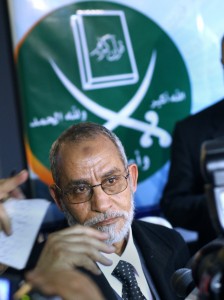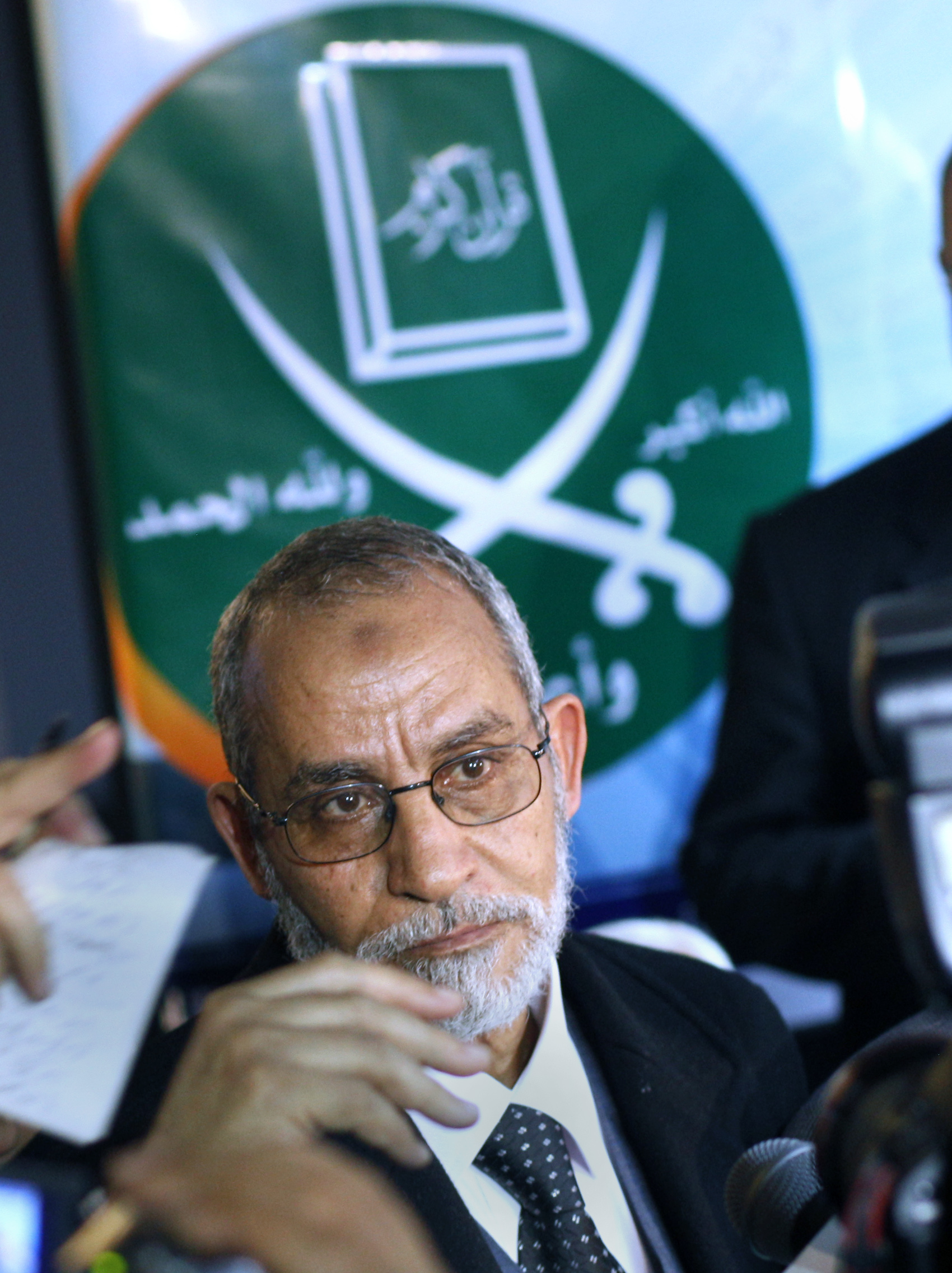
(AP Photo/Amr Nabil)
Mohamed Badie Abdul Mageed Samy, a highly educated man with roots in labour rights and a strong commitment to outreach, is poised to become one of the most influential powers in the ‘new Egypt.’ Yet, his rise from relative obscurity to the forefront of national politics has left many Egyptians perplexed. Liberals view him as an uncompromising religious conservative and even within the Muslim Brotherhood some doubt his ability to lead.
Badie is a mild mannered 68-year old professor of veterinary medicine at the University of Beni Suef. He was born in 1943 in El-Mahalla El-Kubra, a town that is known for its textiles as well as for a potent streak of political activism. Strikes in the small industrial town in 2008 gave birth to the youth wing of the Kefaya party, known as the April 6 Youth Movement for the date of one massive strike. The group’s social media saavy would become ubiquitous five years later in the uprising to topple President Hosni Mubarak.
But several decades earlier, Mohamed Badie and Mahalla had become known to a president or two. In 1965, Badie arrived in Cairo to begin his studies in veterinary medicine. Not even nine months later he was arrested for political activism, as a member of the outlawed Muslim Brotherhood, and sentenced to 15 years alongside the controversial and more militant breakaway leader, Sayyid Qutb. He served nine of those years before a new Egyptian president, Anwar Sadat, showed leniency and freed Badie along with other Muslim Brotherhood members (Qutb, instead, was executed by hanging in 1966).
Wasting no time, Badie returned to his studies and to his political work, serving in the Ikhwan (Brotherhood) administration in Mahalla and later representing the group’s educational association in Yemen. In 1996, he became a member of the Brotherhood’s governing council, the Guidance Bureau.
Badie became the eighth General Masul Guide or chairman of the Egyptian Muslim Brotherhood in early 2010. Arab media, as well as supporters and critics of the Brotherhood, followed closely the selection process that led to his appointment illustrating the continuing importance of the Egyptian branch in the region.
Badie enjoys the staunch support of organized labour, having served as the Secretary General of the General Union of Veterinarians and as the Treasurer of the Union of Medical Professionals, which makes him favorable to poor and working class voters. Still, his appointment in 2010 still came to many as a surprise, it sidelined many better known leaders in the organization, such as Abd al-Moneim Abou el-Fattouh and Mohammed Habib.
With the Muslim Brotherhood daily gaining ground in Egyptian politics, some wonder if there couldn’t be a worse time for the generally more conservative Badie to be leading the organization. After all, he was the one who smuggled the controversial chapters of Sayyid Qutb’s Milestones out of prison. Some even wondered whether he would cause the splintering of the organization.
On the night of December 31, 2010 a bomb ripped through the al-Qiddissin Church in Alexandria killing 23 people and injuring dozens more. Al-Qaeda took responsibility for the attack, rattling the soul of Egypt and unnerving its two major religious communities. In the critical days that followed the attack, the Muslim Brotherhood, under Badie’s leadership, released multiple statements of solidarity, calling for national unity and inter-religious harmony.
Three days after the attack, Badie released a message titled, “One Nation in the Face of Sedition”, stressing that Islam calls for love, peaceful coexistence, fraternity and tolerance. Badie also condemned the attackers and demanded that if apprehended they be punished to the full extent of Egyptian law. His swift and straightforward reaction earned him widespread praise for contributing to defuse sectarian tensions in Egypt.
In the weeks that followed, Egyptian Muslims and Copts took to the streets in small marches and rallies for solidarity under banners that read Ana Masry, I am Egyptian. Muslims also sat in churches and joined masses all over the country on January, 6 2011, Coptic Christmas Eve, declaring that if they were attacked again, Muslims would die alongside their Coptic fellow Egyptians. They were met with the barricades, batons and tear gas of Egyptian State Security forces.
Despite the strong show of support after the attack in Alexandria, the Ikhwan were slow to respond to the calls for the end of Mubarak’s rule. Once they joined, it look as though they were “all in”, tolerating social interactions that staunch religious conservative would have viewed as unacceptable, such as men and women marching, singing, and camping in the square alongside each other.
Badie’s decision to support the demands of the Egyptian people rather than with a pan Islamic identity has won the organization more understanding and appreciation than it enjoyed prior to the revolution. Moreover, Badie’s activism—the fact that he has experienced police brutality and detention and still steadfastedly demanded political change—means that he has strong political credentials for reforming the status quo.
Today Mohamed Morsi, effectively launched from the MB offices, is the elected President of Egypt and working to revive what still survives of the nation’s elected parliament. Nearly two years from the catastrophic parliamentary election, the Muslim Brotherhood under Badie’s leadership, is effectively leading the drafting of Egypt’s Constitution, the revival of Egypt’s dissolved parliament and the advising of the Presidency. All of it, a very long way from Mahalla.

